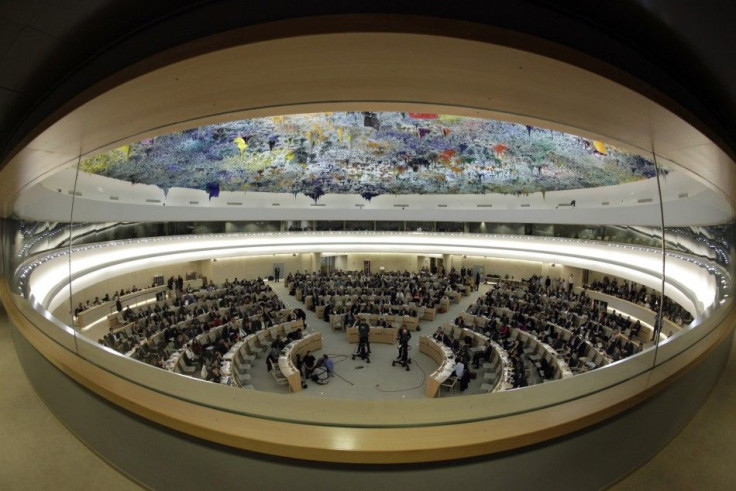Latest U.S. Report Is Timely Human Rights Reminder
Opinion

Nearly 40 years ago, a Congress disgusted with the value-less foreign policy realism of Presidents Richard Nixon and Gerald Ford began to require the State Department to report each year on the human rights records of other countries.
That requirement was part of a package of congressionally driven reforms of the mid-1970s that were designed to elevate human rights within U.S. foreign policy. The reporting requirement, in particular, angered then-Secretary of State Henry Kissinger, who initially refused to comply, arguing that fingering other nations for public obloquy over human rights would complicate U.S. strategic interests.
Congress disagreed, however, and lawmakers expanded the reporting requirement so that it now includes not only its initial focus -- countries receiving U.S. foreign aid -- but all other United Nations members as well.
The State Department has just released its latest annual report, and its write-ups on 199 countries cast an important spotlight on this key issue. We learn, for instance, about a step-up in extrajudicial killings, forced disappearances, and torture and coerced confessions in China; and in public and group executions, amputations and floggings, and arbitrary arrests and detentions in Iran.
The question is whether, in light of growing human rights problems from China and Russia to the Middle East and North Africa, the United States is doing enough to factor human rights into its foreign policy.
The answer is, unfortunately, no.
To be sure, the challenge of promoting human rights -- in essence, freedom and democracy -- is not a simple one. Under the best of circumstances, Washington must weigh its long-term goal of advancing freedom and democracy around the world against such short-term considerations as ensuring regional stability and guaranteeing U.S. access to natural resources.
Moreover, on human rights, we live in particularly unsettled times. For the past two centuries, the advance of human rights around the world has tended to come in what the late political scientist Samuel P. Huntingdon called waves of democratization, interrupted by periods of backsliding.
At the moment, however, we can't say whether we're about to ride another wave or suffer through more backsliding.
Since 1972, the nonprofit Freedom House has published an annual report, Freedom in the World, in which it ranks nations and disputed territories as free (where there is open political competition, a climate of respect for civil liberties, significant independent civic life, and independent media), partly free (in which there is limited respect for political rights and civil liberties), and not free (where basic political rights are absent, and basic civil liberties are widely and systematically denied.)
From 1972 to 2006, the percentage of countries and territories that Freedom House ranked as free rose from 29 to 47, while those ranked as partly free rose from 25 to 30. From 1989 to 2006, the percentage of countries listed as electoral democracies rose from 41 to 64.
Since 2006, however, progress has stalled, with 2011 marking what Freedom House termed the sixth consecutive year in which countries with declines outnumbered those with gains. Among the reasons were sectarian strife in the Middle East; long-term setbacks in the former Soviet countries of Russia, Kazakhstan, and Azerbaijan; and danger signs in such new democracies as Ukraine, Hungary, South Africa, and Turkey.
Where's the world headed? That depends largely on what is potentially 2011's most important development of all -- the Arab Spring.
So far, the popular uprisings that began in Tunisia in late 2010 and swept across the region have toppled four autocrats and begun to plant the seeds of democracy in Tunisia, Egypt, and elsewhere. But, in some places, they have also positioned Islamist parties, with their archaic views of social order, to assume political power. Meanwhile, some surviving strongmen have taken brutal measures to retain power, particularly in Syria where Bashar al-Assad is slaughtering his people by the thousands.
Through these cross-cutting trends of recent years, the United States has sometimes seemed largely oblivious to human rights concerns or, at other times when the world pressed for U.S. leadership, slow to provide it.
In his first year in office, President Barack Obama avoided public criticism of China over human rights and refused a visit with the Dalai Lama for fears of ruffling feathers in Beijing. Also in 2009, he was slow to criticize Tehran over its fraudulent presidential election for fear of complicating his engagement efforts.
During the Arab Spring, Obama has responded more episodically than consistently. While he pushed Egypt's Hosni Mubarak aside and contributed U.S. military force to a European-led effort to help rebels topple Libya's Muammar Gadhafi, he stuck by America's autocratic allies in Saudi Arabia and Bahrain when they faced their own internal unrest.
Of particular note, Obama has eschewed a stronger U.S. role in protecting Syrians from their heartless leader. While al-Assad guns down rebels and civilians in horrific fashion, the latter of whom include women and children, Washington has stood behind UN envoy Kofi Annan's laughable diplomatic efforts.
The longer that Washington refuses growing calls to work with its European allies to arm Syria's opposition, establish safe havens for its people, impose a no-fly zone, and, as a last resort, conduct air strikes on Syria's military, the more likely that al-Assad will retain his grip on power for some time to come.
U.S. passivity in the face of humanitarian horror neither reflects America's values nor serves its long-term interests.
Lawrence J. Haas, former communications director for Vice President Al Gore, is senior fellow at the American Foreign Policy Council and author of Sound the Trumpet: The United States and Human Rights Promotion (out in June from Rowman & Littlefield).
© Copyright IBTimes 2024. All rights reserved.











